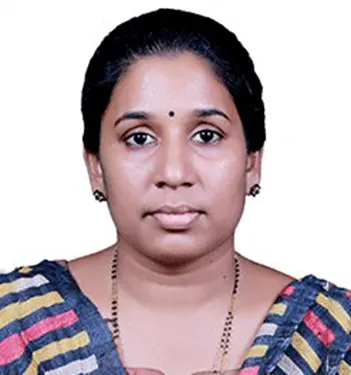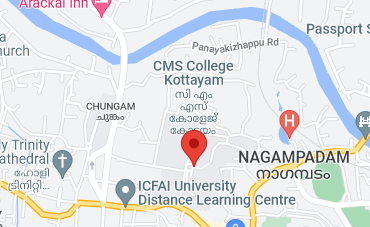Dr. Amrutha Rinu Abraham
Education
- B.Sc., M.G University, 1997
- M.A., M.G University, 2000
- B. Ed., M.G University, 2001
- Ph.D., MG University, 2017
- PG Diploma in Rural Development, IGNOU, 2003
Area of Specialization
- Family and Adolescent Studies
- Sociological Theories
- Gender Studies
Family: Research on Family dynamics is particularly focused on parent-adolescent interaction and relationships, as well as the relationship of elderly individuals. There are studies specifically focusing on the interactions in Single Child Family. Single
Child Family presents a typical small family structure in the present society with enormous scope for sociological study. Since adolescence has been described as a transition stage between childhood and adulthood and a period of preparation for adult living, study of the behavior pattern of the adolescents from single child families is expected to reveal significant facts and findings. Also, exploring the dynamics of relationships between elderly individuals and their adult children or grandchildren, constituting another area of investigation. Kerala has a significant elderly population, and they often live with or near their families due to a strong family support system.
Addressing the experiences of elderly is of great relevance for their well-being.
Relevant Publications:
Single child family and adolescent behaviour pattern A sociological analysis
Adolescents in single child family and friendship relations: A study with special reference to Kottayam District, Kerala
Socialization Process of Adolescents in Nuclear Families with Single Child and More than one Child in Kerala
Adolescents in Single Child Family and Nature and Pattern of usage of Communication Technology: A Study with special reference to Kottayam District, Kerala
2. Gender and Women: Gender equality stands as a transformative vision, a call to dismantle societal structures that perpetuate discrimination based on gender.
Researches dedicated to gender equality with special reference to women navigate the complex terrain of cultural norms, systemic biases, and historic imbalances that have long restricted the full potential of individuals, regardless of gender identity.
Exploring the multifaceted dimensions of gender equality recognize the unique challenges faced by individuals navigating multiple layers of discrimination, fostering a more nuanced understanding of the diverse experiences within the broader
framework of gender equality.
Relevant Publications:
Question Papers as the Site of Gendered Education Practise: A Study of Courses on Gender from Kerala
ചോദ്യക്കടലാസ്എന്ന സങ്കല്പവും കേരളത്തിലെ സ്ത്രീപഠന കോഴ്സ്കളും: ഒരുസമൂഹശാസ്ത്രാനേഷണം.
Safety is not Separation: A Sociological Analysis of ‘She Taxi’
3. Sustainability: Sustainability is a profound philosophy and practice that encapsulates the collective responsibility to preserve and enhance the well-being of our planet and its inhabitants. Sustainability revolves around the delicate equilibrium between environmental, social, and economic dimensions. Embracing sustainability is, therefore, a holistic approach. In the face of global challenges such as climate change, resource depletion, and social inequalities, the need for a paradigm shift in the present
mode of living is addressed in the researches
Relevant Publications:
Harmonizing conservation and development: A revisit based on the holistic paradigm.
Towards Sustainable Habitations: Relevance of Alternative Housing Patterns in the Context of Natural Disasters in Kerala
Climate Change Discourse and Population Policy
Existence Vs Extinction-Need for a new Paradigm of Development
Sustainable Development in a Consumerist Society
- SOCPGS102 CONTEMPORARY THEORY 1
- SOCPGS206 CONTEMPORARY SOCIOLOGICAL THEORY II
- SOCPGS311 CONTEMPORARY THEORY III
- SOCPGELE2 GENDER AND SOCIETY
UGC Sponsored Minor Project titled ‘Impact of Family Welfare Programme on the Socialization of Children’ with a Sanctioned Fund: Rs. 45,000/- & completed in 2016.
Selected as the outstanding NSS Programme Officer under M.G University for the year 2020-22
- Name: Indhu Vijayan
Year of Joining: 2024
Research work: Gendered Space: A Sociological Study on the Impact of
Women’s Unequal Access to Public Spaces on Gender Relations in India - Name: Nedha Fazli MK
Year of Joining 2024
Research work: Social Adjustment and Networking of Student Migrants from
Lakshadweep to Kerala
Sociology
Department


